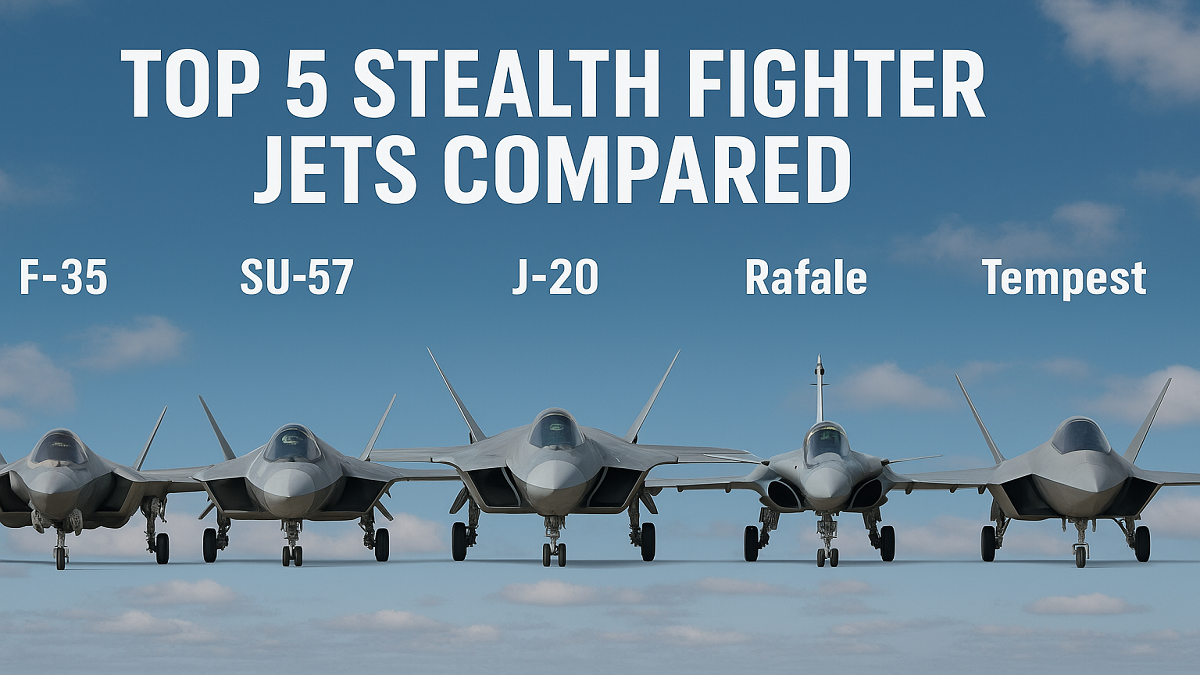In the evolving landscape of aerial warfare, stealth fighter jets represent the pinnacle of modern military aviation. These aircraft are designed to evade radar detection, dominate the airspace, and deliver precision strikes in contested environments. While the United States’ F-35 Lightning II remains the benchmark, other nations have developed—or are developing—their own stealth-capable fighters: Russia’s Su-57, China’s J-20, France’s Rafale, and the UK’s future Tempest program.
This article presents a detailed comparison of these five elite platforms, focusing on stealth design, avionics, weapon systems, engine performance, and strategic significance.
1. Introduction: The Age of Stealth Dominance
Stealth fighters are engineered to reduce radar cross-section (RCS), thermal signatures, and visibility to electronic surveillance. By combining low-observable technologies, advanced sensors, and network-centric warfare capabilities, these jets offer significant tactical advantages.
However, not all stealth fighters are created equal. Some, like the F-35, are operational in multiple countries, while others, like the Tempest, are still in development. Let’s dive into how these platforms compare in today’s and tomorrow’s battlespace.
2. F-35 Lightning II (United States)
Overview
The Lockheed Martin F-35 is currently the most widely deployed fifth-generation stealth fighter. Designed with multi-role capabilities, the F-35 comes in three variants (A, B, and C) and serves in over a dozen countries.
Key Features
- Stealth: All-aspect stealth design using internal weapon bays and radar-absorbent materials.
- Avionics: Features an AN/APG-81 AESA radar, Distributed Aperture System (DAS), Electro-Optical Targeting System (EOTS), and sensor fusion.
- Engine: Pratt & Whitney F135, delivering ~43,000 lbs of thrust with afterburner.
- Weapons: Internal payload up to 5,700 lbs; external up to 18,000 lbs. Can carry AIM-120 AMRAAM, JDAMs, SDBs, and more.
- Network Capabilities: Designed for joint operations, integrating with land, air, and sea assets.
Operational Status
-
Fully operational across the US Air Force, Navy, Marine Corps, and allied nations including the UK, Israel, Japan, and Australia.
3. Su-57 Felon (Russia)
Overview
The Sukhoi Su-57, known by NATO as “Felon”, is Russia’s answer to the F-22 and F-35. Developed by Sukhoi Design Bureau, it combines stealth with supermaneuverability and high-speed combat capabilities.
Key Features
- Stealth: Partial stealth with some compromise due to engine nozzles and airframe design.
- Avionics: Incorporates IRST systems, multiband radar, and electronic warfare (EW) suite.
- Engine: Currently uses AL-41F1 engines (~33,000 lbs thrust); planned upgrade to Izdeliye 30 engine.
- Weapons: Carries R-77, R-73, Kh-59MK2, and hypersonic weapons. Internal and external pylons.
- Supermaneuverability: 3D thrust vectoring nozzles give it superior dogfight agility.
Operational Status
-
Limited production. Entered service with the Russian Air Force, but only a handful are operational as of now. Export interest from India and others.
4. J-20 Mighty Dragon (China)
Overview
The Chengdu J-20 is China’s first operational fifth-generation stealth fighter, developed by the Chengdu Aircraft Industry Group for the People’s Liberation Army Air Force (PLAAF).
Key Features
- Stealth: Low-observable design with canards, internal weapons bays, and radar-absorbent materials.
- Avionics: Advanced AESA radar, electro-optical targeting, data fusion, and satellite links.
- Engine: Early models used Russian AL-31 engines; newer versions use WS-10C, and WS-15 is in development.
- Weapons: Compatible with PL-15 long-range AAM, PL-10, and precision-guided munitions.
- Role Expansion: Recent upgrades suggest evolution from air superiority to multirole functionality.
Operational Status
-
Operational in significant numbers in the PLAAF, with ongoing production and upgrades. Represents a leap in China’s indigenous aerospace capabilities.
5. Rafale (France)
Overview
The Dassault Rafale is a 4.5-generation multirole fighter with advanced stealth features. Though not a full fifth-generation stealth jet, it incorporates significant low observability, sensor fusion, and network-centric features.
Key Features
- Stealth: Reduced RCS due to shape, materials, and weapon bay integration, but not stealthy in the same class as F-35 or J-20.
- Avionics: RBE2 AESA radar, SPECTRA EW system, optronics suite, and sensor fusion.
- Engine: Twin Snecma M88 engines providing ~17,000 lbs thrust each.
- Weapons: Capable of using Meteor, MICA, Scalp EG, Exocet, and nuclear weapons (in French service).
- Multirole Mastery: Air superiority, ground attack, carrier operations, and nuclear delivery.
Operational Status
-
In active service with France, India, Egypt, Qatar, and Greece. Often compared to F-35 in export markets.
6. Tempest (United Kingdom and Partners)
Overview
The Tempest fighter jet is a sixth-generation project being developed by the UK’s Team Tempest (BAE Systems, Rolls-Royce, Leonardo, MBDA), along with Italy and Japan (merging with Japan’s F-X program under the Global Combat Air Programme – GCAP).
Key Features (Projected)
- Stealth: Full-spectrum stealth with adaptive surfaces and sensor-absorbing skins.
- Avionics: Advanced AI co-pilot, swarming drones, quantum radar, and multi-domain connectivity.
- Engine: Adaptive-cycle engine capable of directed energy weapons support and high-power thrust.
- Weapons: AI-managed internal bays, hypersonic missiles, non-kinetic capabilities (e.g., cyber/electronic attack).
- Collaborative Combat: Designed for networked warfare with drones, satellites, and ground systems.
Operational Status
-
Still in development. Expected first flight around 2035. Represents Europe and Japan’s response to U.S. and Chinese dominance in stealth aircraft.
7. Comparative Overview
| Feature | F-35 | Su-57 | J-20 | Rafale | Tempest |
|---|---|---|---|---|---|
| Generation | 5th | 5th | 5th | 4.5th (stealth-enhanced) | 6th (in development) |
| Stealth | High | Moderate | High | Low-Moderate | Expected Very High |
| Avionics | Advanced | Moderate | Advanced | Advanced | Futuristic |
| Weapons | Internal + external | Internal + external | Internal + external | External | Internal (modular) |
| Operational | Yes (global) | Yes (limited) | Yes (China only) | Yes (multi-nation) | No (development stage) |



 Defense Minister Rajnath Singh Inaugurat...
Defense Minister Rajnath Singh Inaugurat...
 MILAN Village Opens in Visakhapatnam For...
MILAN Village Opens in Visakhapatnam For...
 Rajnath Singh Unveils Missile Integratio...
Rajnath Singh Unveils Missile Integratio...








